7 Best ETL Tools to Use in 2024 (Open Source)
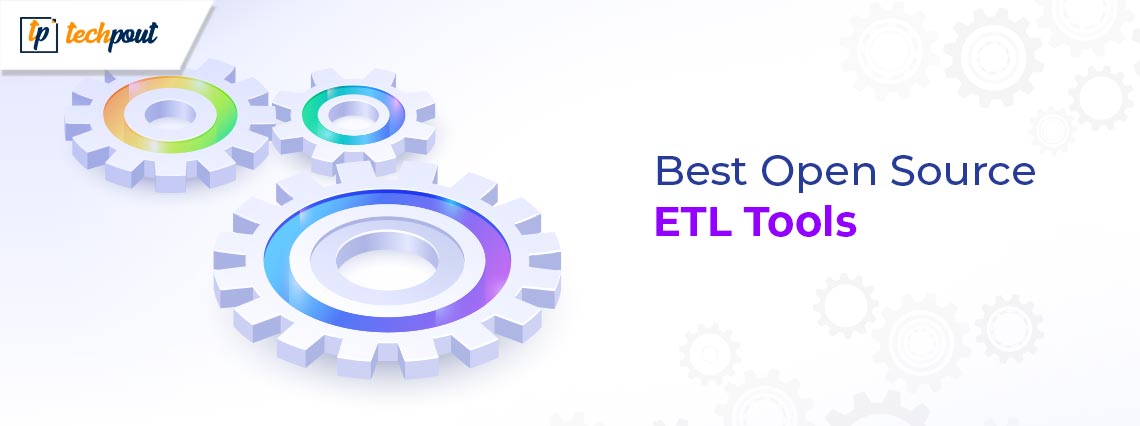
Here’s a list of the best ETL tools for you to use in 2024.
The widespread availability of data is one of the defining characteristics of the Information Age. You have access to data on a daily basis, whether it’s analytics on how much idle time you spend on your mobile devices or an expected arrival date for one of your goods, and you use this data to guide your choices and create objectives. The use of data by organizations is analogous to that of individuals but on a far greater scale.
They need to standardize the data that they have about customers, workers, goods, and services, and then communicate it across a variety of teams and information management systems. It is possible that this information will be made accessible to third-party partners and suppliers.
The extract, transform, and load (ETL) approach is used by businesses in order to create highly scalable information exchange and to steer clear of data silos. This strategy is used for the purpose of formatting, passing, and storing data across systems.
ETL technologies may help firms standardize and scale their data pipelines, which is especially helpful given the massive amounts of data that enterprises manage across all of their business activities.
Top Best Free ETL Open-Source Tools in 2024
The coming sections of this guide enlist some of the most outstanding open-source ETL tools to try. Have a look at all of these tools and then use the ones that suit your requirements.
1. Panoply
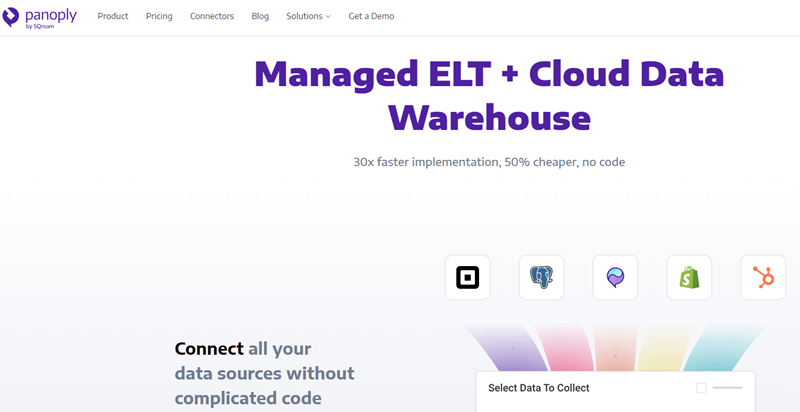
Let’s initiate this list of the Best ETL Tools with Panoply. Panoply is an automated and self-service cloud data warehouse with the goal of making the process of integrating data much more straightforward. Panoply is compatible with any data connector that has a conventional ODBC or JDBC connection, a Postgres connection, or an AWS Redshift connection.
Panoply, an open-source ETL, customers now have the ability to integrate Panoply with other ETL tools, such as Stitch and Fivetran, to further improve the processes that they utilize for data integration.
The fact that Panoply intends to provide the dual functionality of data warehouse and ETL solutions is the primary source of the problem. Panoply is not worth considering if you are content with the cloud data warehouse that you are currently using and have no plans to switch providers.
Also Read: Best Free Network Monitoring Software (Open Source)
2. AWS Glue
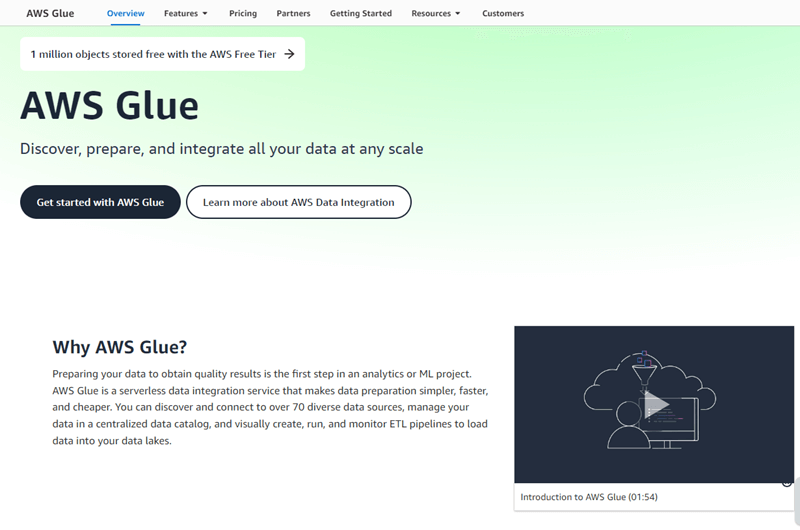
The next one of the AWS Glue is AWS Glue. Amazon Web Services offers a fully managed ETL solution called AWS Glue. This service is designed for workloads related to big data and analytics. AWS Glue is a fully managed, end-to-end ETL product that works nicely with the rest of the AWS ecosystem. Its architecture eliminates the pain associated with ETL workloads and provides end-to-end coverage.
It is important to note that AWS Glue is serverless and an open-source ETL. This means that Amazon automatically creates a server for users and then shuts it down after the task has been completed. Users of AWS Glue have, on the whole, given the service very positive ratings.
It has been given the title of “Leader” in the category of ETL tools for the winter of 2024 on the G2 rating system, where it presently has 4.2 out of a possible 5 stars. However, Integrate.io’s list of the seven top ETL tools does not include AWS Glue since it is less versatile than other platforms and is often best suited for customers who are already operating inside the AWS environment.
3. Pentaho
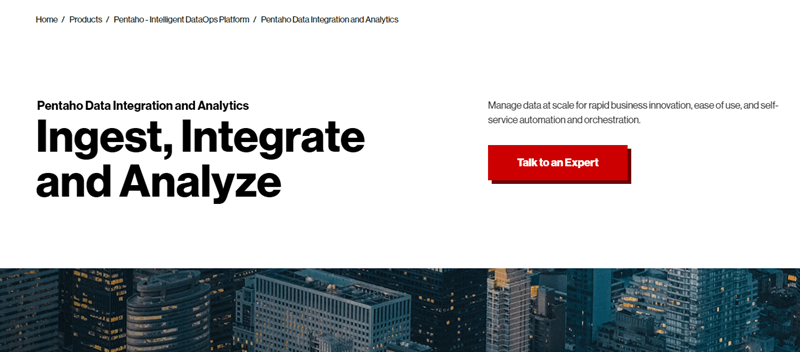
Here’s another one of the Best ETL Tools. Data integration and analytics are performed using the open-source platform known as Pentaho, which is sometimes referred to by its former name, Kettle. This platform is provided by Hitachi Vantara.
Users have the option of downloading the open-source ETL free community edition or purchasing a license for the enterprise version from a third-party vendor. Pentaho, much like Integrate.io, comes with a user-friendly interface that makes it possible for ETL novices to construct reliable data pipelines. Pentaho, on the other hand, comes with its own unique set of downsides, such as a restricted number of template options and several technological challenges.
On G2, Pentaho presently has an average rating of 4.3 out of 5 stars, although some customers have voiced their dissatisfaction with the software, stating that they have run across issues such as.
Also Read: Best Free Library Management Software (Open Source)
4. Matillion

Matillion is one of the Best ETL Tools that runs in the cloud and has the ability to link data with other cloud services such as Redshift, Snowflake, BigQuery, and Azure Synapse. Data transformations may be created in Matillion by users using a simple point-and-click interface or by describing them in SQL. Both methods are available to users.
The number of viable SaaS providers in this open-source ETL is low in comparison to the other solutions on this list. Unfortunately, Matillion suffers from the same issue as Striim does. Additionally, a reviewer on G2 (where Matillion now has 4.4 out of 5 stars) states that “the price scheme is tough for light-usage clientele.
It is not determined by the number of tasks or computer resources that are being consumed, but rather by the amount of time that the virtual machine is switched on.
5. Fivetran
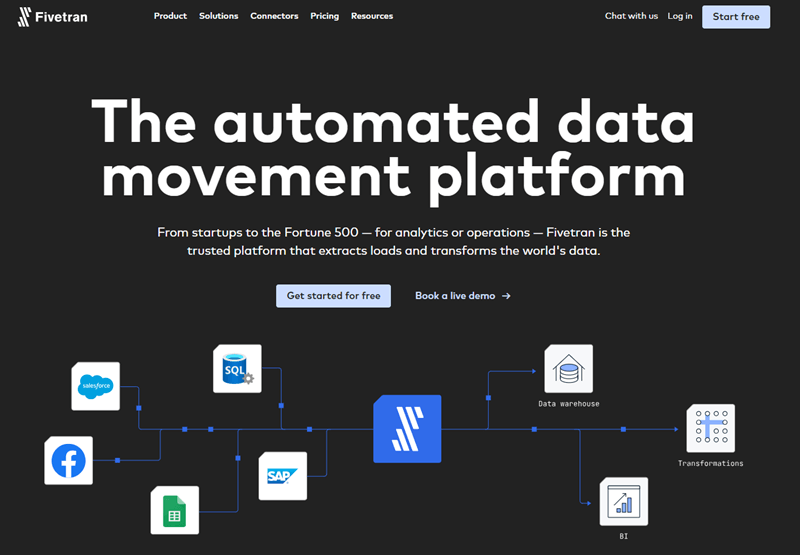
Cloud-based Best ETL Tools solution Fivetran provides data integration with data warehouses such as Redshift, BigQuery, Azure, and Snowflake. Fivetran is referred to as “Fivetran.” Fivetran’s extensive library of data sources, which includes support for many SaaS platforms as well as the flexibility to build in your own bespoke connectors, is one of the platform’s most notable advantages.
The consumption-based pricing mechanism that this open-source ETL uses, on the other hand, has been criticized by a few G2 reviewers. (The platform formerly levied fees on its users based on the number of connections they used, which, in some data integration use cases, may work out to be more cost-effective.) In addition, a small percentage of customers have reported concerns with the software’s customer service and its ability to resolve technical issues: “Fivetran is a black box, and when there is a problem, it’s really difficult to diagnose.” Their customer service line is also not something to write home about.
Also Read: Best Free Image Recognition Software [Open Source]
6. Stitch Data
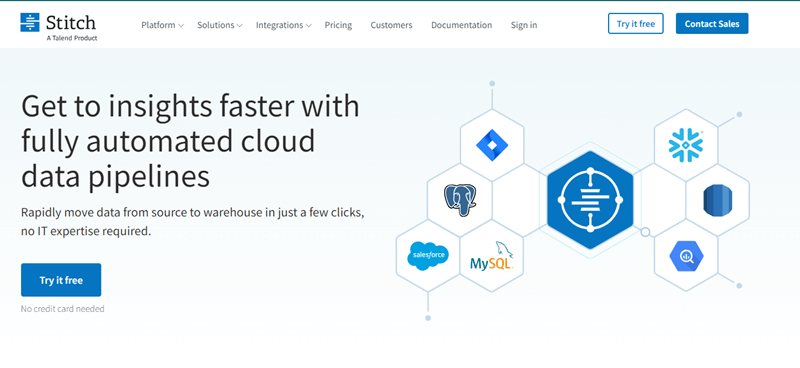
Stitch is a platform for the integration of ELT data that is open source. This is one of the best ETL Tools. As with Talend, it provides subscription service levels for more complex use cases and bigger amounts of data sources than its free counterpart does. The parallel is appropriate in more ways than one, including the following: In November of 2018, Talend completed the acquisition of Stitch.
This is an open-source ETL that differentiates itself from similar ones by providing users with self-service ELT and automated data pipelines. These features simplify the process of data integration. However, prospective users need to be aware that the ELT tool that Stitch provides does not carry out arbitrary modifications. Instead, the team behind Stitch recommends that transformations be placed on top of raw data in layers after the data has been imported into a data warehouse.
7. Oracle Data Integrator
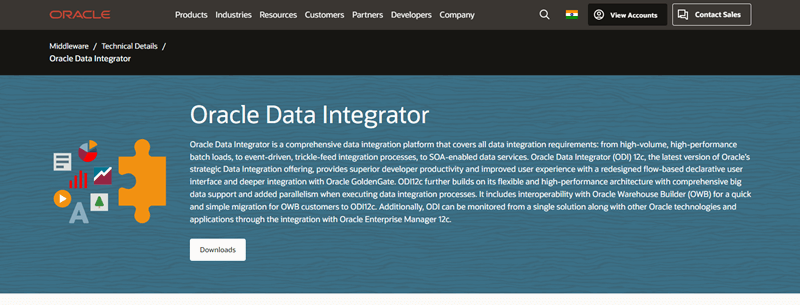
Oracle Data Integrator, sometimes known as ODI, is an all-encompassing data integration solution that is a component of the Oracle data management ecosystem and hence, one of the Best ETL Tools. Users who are already familiar with other Oracle programs, such as Oracle E-Business Suite (EBS) and Hyperion Financial Management, will find that this platform is an excellent alternative to consider.
Oracle Data Integration (ODI) is available both on-premises and on the cloud, with the latter option being referred to as Oracle Data Integration Platform Cloud.
This an open source ETL, unlike the majority of the other software products on this list, mainly serves ELT workloads (though it is still capable of completing ETL). This distinction may either be a selling point or a dealbreaker for consumers, depending on their preferences. In addition to this, ODI is not as feature-rich as the majority of the other tools discussed in this piece; some ancillary capabilities may be found in other Oracle application alternatives.
Summing Up: Best ETL Tools (Open-Source)
ETL, or “Extraction, Transformation, and Loading,” is a core business process that is used by companies to construct data pipelines. These pipelines provide an organization’s executives and stakeholders with the information they need to do their jobs more effectively and make informed choices.
Also Read: Best Open Source CRM Software For Small Businesses
So, the Best ETL Tools are the way to go. No matter how complicated or varied their data may be, teams are able to reach previously unattainable levels of speed and consistency when the process is powered by ETL technologies.


